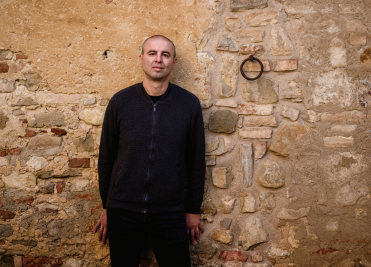Nikola Madžirov (poet, essayist, translator)
was born in 1973 in Strumica, in a family
of war refugees from the Balkan Wars.
When he was 18, the collapse of Yugoslavia
prompted a shift in his sense of identity – as
a writer reinventing himself in a country
which felt new but was still nourished by
deeply rooted historical traditions. His
poems and essays are translated into more
than forty languages. He) was given several
prestigious national and international
awards. American composers Oliver Lake,
Michael League and Becca Stevens have
composed music based on Madzirov’s poems
Nikola Madzirov is one of the coordinators
of the international poetry network
Lyrikline, based in Berlin, and is member of
the jury for The Griffin International Poetry
Prize 2023. He lives in the city of his birth.
True nomads build homes before they leave them. The same is true for birds and construction workers, who sleep on-site, until they finish building the home that does not belong to them. Only he who builds and leaves knows the secret of historical non-belonging, unlike those who build and then destroy, or the ones who move in and out. I would like to speak of leaving rather than living, as we often identify home through the prism of our own spatial impermanence, or by means of how genuinely our home leaves us, before we leave it. When birds leave their nests, they fly away; when people leave their homes — they remember. Each house has its own foundations; it has its own walls and a roof to protect it from rain, stray bullets, and false prophets. All inherited fears and longings are conserved into it; all shared stories and traces from the past are inscribed on its floorboards. The home is an architectural construction of our personal memories and a place to be left as soon as the sense of being abandoned settles within our mental space. In fact, being abandoned is the state of lack of memories, and the state of staying in a vast space that extends both our shadow and the echo of our own voice. Lacking memory of our own nativity, we zealously remember our native homes, thus erasing the hospitals of our birth from the maps of mutual living places. Native homes cannot be built – they are inherited, so leaving them is more an act of initiation rather than nomadism. Gaston Bachelard says that — even with no memories — our native home (as a counterpoint to a dream home) is physically engraved within us, and that it is a group of organic habits.1 And habits are the deadliest enemies of leaving, of love, and of ideological disobedience. Here in the Balkans, the elderly women cross themselves almost each night — before they go to bed — claiming to do this for a painless transition to another, permanent home. I could not understand their habit, but the desire for a painless passing away has stayed in my memory as a lead weight on a scale, to balance the pain of birth. Czeslaw Milosz wrote that, after leaving his socialist homeland, he felt like a person who could move around freely, but wherever he went he carried with him a long chain that was always pulling him to the same place — it was primarily an external chain, but it also existed within him.2 Regardless of all the imposed geopolitical fences, it is possible to escape ideology, as it is most often the antonym of memory and of present time, always offering a future only. And only false prophets together with traders of absolute truths are not able to escape a future. Homelessness occurs when we leave the places whose walls used to be thick enough for all the voices of collective happiness and of personal alienation. When we leave our home without turning back, then the very act of leaving becomes our home, while the rings of the lengthy chain remain tightly attached to us through the language of our mother, of childhood, through the sun rays falling upon the pillow in the nursery. In our memories, the walls of leaving are more real than the walls of living. I often imagine a home that is never left. Its yard is fenced by the line of the horizon; it has high balconies with abandoned nests and dirty ashtrays; its windows uncover the dust of the city and the flickering lights of the TV set that someone forgot to turn off. I think about a home where one arrives and never leaves. A home that cannot be inherited. I think about the dynamic bond between the corporeality of the inhabitant and the geometry of space, about the length of thresholds and the area of desires. I think about the ‘refugees’ and their new, temporary homes that they supply with new insecurities and furniture arranged in the very same manner as the furniture of the home they have left. I think about all those who struggle to leave the life in their homes, those fortified altars of personal belonging. I am an involuntary descendant of refugees, and an heir of temporal homes. I have not built a home, thus I have nothing to leave, even when I move my body-home from one place to another, from one geometrical truth to another.
1. Gaston Bachelard, “The Poetics of Space” (Beacon Press, 1994).
2. Czeslaw Milosz , “The Captive Mind” (Penguin Classics, 2001)






